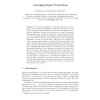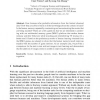1211 search results - page 59 / 243 » Predicting building contamination using machine learning |
115
click to vote
ML
2007
ACM
15 years 1 months ago
2007
ACM
In many learning problems prior knowledge about pattern variations can be formalized and beneficially incorporated into the analysis system. The corresponding notion of invarianc...
159
click to vote
EUROCOLT
1999
Springer
15 years 5 months ago
1999
Springer
We consider algorithms for combining advice from a set of experts. In each trial, the algorithm receives the predictions of the experts and produces its own prediction. A loss func...
149
Voted
ICML
2000
IEEE
16 years 2 months ago
2000
IEEE
This paper has no novel learning or statistics: it is concerned with making a wide class of preexisting statistics and learning algorithms computationally tractable when faced wit...
157
click to vote
PKAW
2010
14 years 12 months ago
2010
How humans infer probable information from the limited observed data? How they are able to build on little knowledge about the context in hand? Is the human memory repeatedly const...
COLT
2008
Springer
15 years 3 months ago
2008
Springer
Boosting algorithms build highly accurate prediction mechanisms from a collection of lowaccuracy predictors. To do so, they employ the notion of weak-learnability. The starting po...


